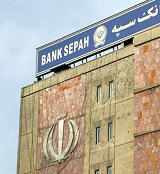 The Treasury Department announced today the imposition of sanctions on Iran’s fifth-largest state-owned bank, Bank Sepah, because of its financial support of Iranian firms engaged in nuclear and missile proliferation. According to Treasury, Bank Sepah has been involved, among other things, in assisting Iran’s Aerospace Industries Organization (AIO) in arranging payments to North Korea for transfer of missile technology to Iran and in financing a sale of missile components from a Chinese firm to Iran.
The Treasury Department announced today the imposition of sanctions on Iran’s fifth-largest state-owned bank, Bank Sepah, because of its financial support of Iranian firms engaged in nuclear and missile proliferation. According to Treasury, Bank Sepah has been involved, among other things, in assisting Iran’s Aerospace Industries Organization (AIO) in arranging payments to North Korea for transfer of missile technology to Iran and in financing a sale of missile components from a Chinese firm to Iran.
Bank Sepah’s participation in these transactions shouldn’t be that surprising given its name. “Sepah” means “army” in Farsi making Bank Sepah, literally, the Army Bank.
Treasury’s action here against Bank Sepah is more saber-rattling than anything else. As a state-owned bank, Bank Sepah and its branches and subsidiaries are already subject to comprehensive restrictions on their dealings with U.S. persons and firms. The effect of the designation will be to restrict Bank Sepah from involvement in the few activities otherwise permissible to Iranian banks, e.g., involvement in non-commercial monetary remissions or the financing of licensed transactions.
In addition to designating Bank Sepah, the Treasury action also designated Ahmad Derakhshandeh, the bank’s managing director and chairman of the board. Why Mr. Derakshandeh was singled out for designation among the many officers and directors of the bank is not clear. Again the designation may be more symbolic than anything else, meaning simply that Mr. Derakshandeh will have to avoid staying in the Prince de Galles, the Intercontinental or any other American-owned hotel on his next trip Paris.
 Permalink
Permalink
Copyright © 2007 Clif Burns. All Rights Reserved.
(No republication, syndication or use permitted without my consent.)

 Posted by
Posted by  Category:
Category: 

